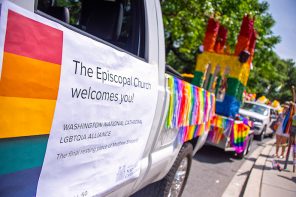On Friday, Katharine Jefferts Schori, Presiding Bishop of the Episcopal Church, and Mark Sisk, Bishop of the Episcopal Diocese of New York, issued separate letters in response to the ongoing conflict between members of the Occupy Wall Street movement and Trinity Episcopal Church, Wall Street, on whose property OWS has hoped to continue its occupation after having been evicted from Zuccotti Park in November.
Trinity Wall Street and the Episcopal Church are, it seems, trying to maintain a delicate balance in their approach to Occupy Wall Street, and their consistent ministry to participants in the movement is laudable. Their active chaplaincy, preaching, and material support has been a powerful reminder of the moral role that churches and other religious groups continue to play even as institutional religion becomes more and more irrelevant in everyday life. Indeed, Trinity Wall Street and many other Episcopal Church communities, have made clear that “being church” is much more than maintaining a building where fewer and fewer people gather to worship for an hour or so on Sundays. They have illustrated the Christian understanding of the call of the faithful to be Christ’s body in the world throughout the Occupy protests, and this has made me proud to be an Episcopalian.
It is because of this powerful, prophetic witness to the core values of Christian faith that I am so deeply disheartened by both Sisk’s and Jefferts Schori’s letters. Clearly, the use of Duarte Square by OWS protesters carries serious implications. If I were the CEO of Trinity Wall Street, I’d certainly worry about liability that might put the church at risk, limiting its ability to engage in other meaningful ministries. I’d be concerned about the harm that might come to protesters themselves at the hands of police, who have time and time again acted violently in the face of peaceful resistance. Such violence, whatever the cause and source, would surely impute to the church’s reputation in a variety of potentially damaging ways. I would worry, too, about the church’s relationships to the police and other city agencies, as these would likely be fractured by offering sanctuary for continued nonviolent protest. And, if I were the CEO of Trinity Wall Street, I’d be alarmed at the idea of the “unspecified use” apparently demanded by the OWS protesters.
But, of course, Trinity Wall Street does not have a CEO. It has ministers. Ministers who are called stand with those on the margins of society in practical rather than merely theological ways. Ministers (“servants,” by the Latin root) who are meant to go ‘all in’ for the sake of ‘those in any kind of need or trouble,’ as the OWS protesters seem clearly to be. I don’t know whether that means opening Duarte Square for encampment. But I do feel confident that ministry in this case calls for something other than the hardhearted rhetoric at play in the letters from Sisk and Jefferts Schori, which seem to raise the specter of violence on the part of a movement that has consistently acted nonviolently, and to call for an adherence to arbitrarily applied civil law that would cause many followers of Jesus Christ to scratch their heads in dismay.
So, too, might others of whatever religious affiliation (or lack thereof) who just last month watched St. Paul’s London muck about on what Rowan Williams, the Archbishop of Canterbury, finally felt called to establish as the wrong side of the Occupy movement for Christians. After weeks of painful resignations and threatened lawsuits, Williams pressed for a less strident, more engaged response to the sort of challenge facing Trinity Wall Street in response to a question about protesters’ use of the “WWJD?” (What would Jesus do?) slogan:
WWJD? He’d first of all be there: sharing the risks, asking the long and hard questions. Not just taking sides but steadily changing the entire atmosphere by the questions he asks of everybody involved, rich and poor, capitalist and protester and cleric. What changes the world isn’t a single formula for getting the right answer but a willingness to stop and let yourself be challenged right to the roots of your being.
And, just in case Williams’ often frustrating via media engagement with questions of human sexuality might invite the dismissal of his insight by progressive American Anglicans, morally unimpeachable Archbishop Desmond Tutu offers, in a letter yesterday to OWS, a more specific plea to Trinity Wall Street leaders to make space for the protesters:
I appeal to them to find a way to help you. I appeal to them to embrace the higher calling of Our Lord Jesus Christ—which they live so well in all other ways—but now to do so in this instance… can we not rearrange our affairs for justice sake?
Again and again the Episcopal Church has been on the right side of issues of justice and equality, and Trinity Wall Street has often been at the forefront of these efforts. There’s no questioning the complex reality and competing demands that have made this situation so particularly vexed for Trinity Wall Street. And there is no good reason to call out as a corporate lackey of any sort a church that has consistently used its substantial financial, social, and political capital on behalf of those in need.
But we may pray, those of us who do, that the stresses that called the church, the bishop, and the presiding bishop into such wrongheaded, divisive, and uncharitable pronouncements will abate to the extent that they may embrace a more healing approach to the dilemma—and the opportunity—they now face.




